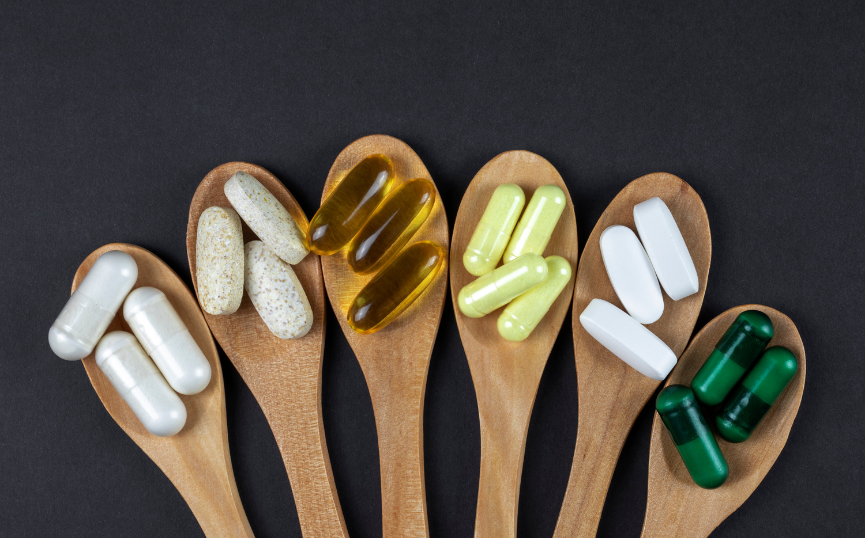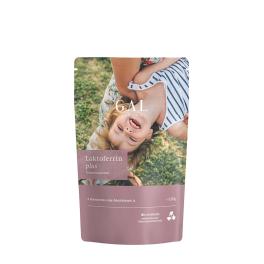Vitamin deficiency symptoms in winter
Winter is here, but good to have you back! Snowy landscape outside the window, warming up by the fireplace, protein cappuccino in front of your favourite TV show. That's all well and good, but nutrient deficiencies can make the mood of the coming holidays a memory. Vitamin deficiencies can complicate our daily lives and predispose us to illness. Ever feel lethargic in winter? Have you ever been so tired that you almost don't want to get out of bed? Or the other way round: you've had insomnia? Maybe you've caught a bad cold a lot lately? Or are your mood swings getting harder to control? These could all be symptoms of a vitamin deficiency.

Studies confirm that the micronutrient content of our vegetables and fruits is decreasing year by year.1 Although certain ethnic and social groups are more vulnerable to nutrient deficiencies. Yet, with the proliferation of dietary supplements and micronutrient fortification of processed foods, the majority of people still do not need to fear deficiences. Statistics show varying results, with some sources reporting a huge proportion of people experiencing vitamin deficiency symptoms, while other studies report fewer.
Prevention is better than experiencing the discomfort of vitamin deficiency! Therefore, a moderate dose of vitamin and mineral supplementation will certainly not miss the mark. The only question is, which are the key vitamins and minerals you need more of in winter?
Let’s do it justice today, on the topic of micronutrient deficiencies! Note: in this article, the words vitamin deficiency and micronutrient deficiency will alternate. In both cases we mean a lack of vitamins and trace elements that are essential for the body.
How do we recognise a micronutrient deficiency?
Symptoms of vitamin deficiencies can develop gradually, so it can be difficult to recognise the immediately6. Furthermore, symptoms often overlap with other diseases – so a final conclusion can only be drawn after a blood test. If you have any of the following symptoms of micronutrient deficiency (also), it is always a good idea to seek medical advice:
- constant tiredness and fatigue
- frequent illnesses and infections
- dry and cracked skin
- hairloss
- mood swings, lethargy
- vision problems
- slow wound healing
- haemophilia
- lethargy, depression
- Pain in several joints that is difficult to relieve and is associated with muscle tone tightness.7
Breastfeeding mothers, new mothers and children are more vulnerable to vitamin deficiences because their bodies need more nutrients.
Mothers with nutrient deficiencies are more likely to have miscarriages or birth (and development) defects, and are more likely to have birth complications.
The health of breastfeeding mothers also determines the health of their newborn babies, especially in the first six months after birth. The quality of breast milk, the composition of which naturally depends on the mother’s health, nutrition and lifestyle, is essential for the baby’s proper development.
Vitamin deficiencies in children increase the risk of mental and physical developmental disorders and increase the risk of infections.
Therefore, vitamin deficiencies should be avoided at all costs. Doctors nowadays prescribe prenatal vitamins for all babies, which are also worth taking during breastfeeding. For more information on the nutritional needs of the post-pregnancy period, click here.
Vitamin deficiency: statistics
Micronutrient deficiencies in low-income countries. More than 2 billion people worldwide experience symptoms of vitamin and mineral deficiencies. The most common deficiencies are related to vitamin A, iodine, iron and zinc.2 These conditions affect poorer countries the most, where people lack access to a variety of essentials and eat a monotonous diet (if they eat at all). In these countries, deficiencies increase mortality rates from infectious diseases such as diarrhoea, measles, malaria and pneumonia.
In another study3, up to 45% of people in the US may suffer from problems caused by vitamin A deficiency. In addition, 46% may suffer from symptoms of vitamin C deficiency, 95% from vitamin D deficiency, 84% from vitamin E deficiency and 15% from zinc deficiency.
By contrast, another study4 found that the number of people with folate, vitamin A and vitamin E deficiencies is barely 1% in the US. Furthermore, iron deficiency can reach 10% of vitamin B6 and D deficiency and vitamin D deficiency can jump up to 31% in certain ethnic groups. Furthermore, young women may be more at risk of iodine deficiency.
According to the statistics: the most important vitamins to replenish in winter
Vitamin D8
So, the vitamin of sunshine, that's certainly nothing new! What few people may already know is that it is essential for the proper functioning of the immune system, in addition to bone health. Furthermore, because of its role in inflammation, it is important for recovery from injury (tissue and cellular) and disease. Indeed, a growing number of studies confirm the antioxidant properties of vitamin D.10,11
Vitamin D deficiency is the primary cause of a disease called angioedema, a bone disease, but it also causes other symptoms. Symptoms of vitamin D deficiency:
- Weakness,
- Fatigue,
- muscle and bone pain,
- frequent infections,
- and lethargy.
In winter, we get very little sun, so most people don't get enough vitamin D, mainly because there are few foods known to be high in vitamin D. P.S.: seafood and mushroom lovers are preferred.
Vitamin C9
A pillar of immune boosting. It is a powerful antioxidant that aids tissue regeneration, relieving the immune system and providing direct protection against damage caused by infections. It also promotes the absorption of iron, which is crucial for blood formation.
Plus: Antioxidants help fight oxidative stress. Oxidative stress refers to the oxidation of cells, a phenomenon in which harmful free radicals (which are also produced by infections, but also by the body's internal processes) steal electrons from body cells. Antioxidants supply electrons to the damaged cells, regenerating them. If, on the other hand, a very small component (molecule) of a cell is left in a state of electron deficiency, immune and inflammatory processes are essential for recovery. So regenerating antioxidants relieve the immune system, thus indirectly strengthening it.
How can vitamin C be replaced from the diet? Eat plenty of citrus fruits, kiwis, peppers, berries and sauerkraut, most of which is readily available in winter (even in frozen form).
Symptoms of vitamin C deficiency:
- Fatigue,
- weak immunity,
- slow wound healing,
- bleeding gums,
- dry skin.

B vitamins12
That is, energy vitamins: vitamins for energy production processes. The family of B vitamins (especially B12 and folic acid) are essential for the proper functioning of the nervous system, energy production and blood formation.
How can B-complex vitamins be replaced?
Eat whole grains, pulses, eggs, liver, dairy products or take a B-complex supplement!
Pro tip: the active ingredient content of B-complex is not nearly the same. Many people suffer from a folic acid metabolism disorder, which means that ordinary folic acid is not processed well by the body, so it is worth choosing methylfolate.15 It is also worth nothing that the more naturally occurring vitamin subforms a supplement contains, the better its utilisation and effectiveness. If you just need a B-complex vitamin, choose Wise Tree Naturals Vitamin B Complex.
Symptoms of vitamin B deficiency:
- Memory problems,
- irritability,
- weakness,
- anemia,
- dry skin
- and hair loss.
Vitamin A13
The vitamin of vision! As a natural pigment, beta-carotene and retinol derivatives (vitamin A subforms) contribute to good vision, strengthen the immune system and help the skin regenerate. In winter, when the skin is more prone to dehydration, it is particularly important to replenish this vitamin.
How do we supplement vitamin A?
Eat carrots, pumpkin, sweet potatoes, spinach, liver or a vitamin A rich supplement.
Symptoms of vitamin A deficiency:
- Dry skin,
- night blindness (wolf blindness),
- and susceptibility to infections.
Vitamin E14
Vitamin E is a powerful antioxidant that protects cells from oxidative stress and contributes to a healthy immune system. Vitamin E is known to have 8 subforms, the ratio of which in a dietary supplement is very important. Most supplements contain only tocopherols, while tocotrienols22, which are at least as important, are not. Another point is GAL's multivitamins, which combine the power of tocopherols and tocotrienols.
Symptoms of vitamin E deficiency:
- Muscle weakness,
- weak immunity
- and vision problems.
How do we supplement vitamin E?
We can provide the necessary amount by consuming oil seeds, vegetable oils (e.g. sunflower oil, almond oil) and avocados.
Zinc16
Zinc is a real antidote to hair loss! Of course, this is only one of the properties of zinc; it is also essential for the proper functioning of the immune system, wound healing, skin health. It is also important for cell growth, DNA synthesis and hormone balance. It is particularly useful in winter as it can help fight colds and infections.
Symptoms of zinc deficiency:
- Frequent infections, weakened immune system.
- Slow wound healing.
- Hair loss and brittle nails.
- Dry, flaky skin, acne or dermatitis.
- Reduced sense of taste and smell.
How do we supplement zinc?
The richest sources of zinc are meat (especially red meat), shellfish, eggs, whole grains, pulses, nuts, seeds and dairy products. For vegetarians, pulses and seeds may be particularly important. If they cannot be covered by our diet, they should be taken in supplement form. It should be noted that it is important to be careful about the dosage, as excessive intake of zinc can interfere with the absorption of other minerals such as iron. As for iron, it is of paramount importance to take iron only on medical advice, as in many cases iron levels can be restored by improving iron absorption.
Iron17
Iron is essential for maintaining adequate oxygen levels, as iron is needed to produce our main oxygen-carrying protein: haemoglobin. Maintaining adequate iron levels is key for energy, mental performance and immune health. During the winter months, when exhaustion and fatigue are common, iron deficiency can be particularly problematic.
Symptoms of iron deficiency:
- Fatigue, tiredness, weakness.
- Pale skin, feeling cold in the extremities.
- Headaches, dizziness, difficulty concentrating.
- Faster heartbeat.
- Hair loss, brittle nails.
How do we replace it?
Iron-rich foods include red meats, liver, egg yolks, spinach, lentils, chickpeas and tofu. Iron of animal origin (heme iron) is more easily absorbed than iron of plant origin (non-heme iron), so increasing iron intake on a vegetarian diet requires special attention. The absorption of iron can be helped by the simultaneous consumption of vitamin C and cysteine (e.g. citrus fruits, peppers), while the simultaneous consumption of coffee, tea and calcium-rich foods can hinder it. Because in many cases iron supplements (especially those that do not contain iron sulphate) can cause diarrhoea and may not be properly absorbed18, we at Vitamin360 believe in iron supplementation from nutrients and in naturally improving iron absorption.
How can iron absorption be improved?
- It is worth taking a cysteine amino acid supplement, especially if you are on a vegetarian diet. Studies have found that concomitant consumption of cysteine with high-iron vegetables can double the absorption of the non-heme iron they contain.23
- Higher vitamin C intake would also be important because, as we have seen, vitamin C also improves iron absorption.
- Eat iron-rich foods such as beetroot, spinach, lentils, chickpeas and tofu.
- Avoid foods high in phytates such as: cereals, beans and oilseeds.
- An alternative to iron substitutes with fewer side effects may be lactoferrin supplements. In addition, lactoferrin has anti-inflammatory effects - partly justifying its ability to stimulate iron levels.24,25

Omega-319
Although not everyone needs iron supplements, Omega-3 is needed by almost everyone except Eskimos! The Omega 3 fatty acids in fish oil are almost like vitamins. Of course they are not. 😊
Omega-3 fatty acids have a unique ability to reduce cellular inflammation - a quasi-vitamin C-like (yet different) health-promoting effect. The cell wall (membrane) is essential for cell-to-cell contact and cell health. The Omega-3 fatty acids that make up the cell wall are involved in hormonal regulation, nervous system health and even energy production.
Some sources suggest that we should drastically increase Omega-3 intake for those who follow a Western diet, i.e. eat very little algae and seafood.21
Vitamin360 winter recommendation
As with most of our recommendations, we wanted to keep it simple so you don't have to buy your single-component vitamins and minerals one by one. So we thought we'd choose one of the best formulated multivitamins, GAL+ Multivitamin. This formula contains sufficient amounts of iodine, zinc, vitamins A, B, C, D, E and K. However, it does not contain iron, so if you need extra iron, take GAL Lactoferrin plus (after consulting a doctor, of course).
The GAL + multivitamin does contain extra Omega 3 fatty acids, but in our opinion it would not hurt to take extra of these, so take 1 capsule of GAL Omega 3 Eco per day with the multivitamin.
The GAL + multivitamin does not contain extra calcium either. If necessary, it should be supplemented with Wise Tree Naturals Calcium Complex.
- Bhardwaj, R.L.; Parashar, A.; Parewa, H.P.; Vyas, L. An Alarming Decline in the Nutritional Quality of Foods: The Biggest Challenge for Future Generations’ Health. Foods2024, 13, 877.
- https://www.who.int/publications/m/item/WHO-WFP-UNICEF-statement-micronutrients-deficiencies-emergency:
- Reider CA, Chung RY, Devarshi PP, Grant RW, Hazels Mitmesser S. Inadequacy of Immune Health Nutrients: Intakes in US Adults, the 2005-2016 NHANES. Nutrients. 2020 Jun 10;12(6):1735. doi: 10.3390/nu12061735. PMID: 32531972; PMCID: PMC7352522.
- https://www.cdc.gov/nutrition-report/about/index.html
- Knapik JJ, Farina EK, Fulgoni VL 3rd, Lieberman HR. Clinically-diagnosed vitamin deficiencies and disorders in the entire United States military population, 1997-2015. Nutr J. 2021 Jun 15;20(1):55. doi: 10.1186/s12937-021-00708-2. PMID: 34130698; PMCID: PMC8207601.
- Kiani AK, Dhuli K, Donato K, Aquilanti B, Velluti V, Matera G, Iaconelli A, Connelly ST, Bellinato F, Gisondi P, Bertelli M. Main nutritional deficiencies. J Prev Med Hyg. 2022 Oct 17;63(2 Suppl 3):E93-E101. doi: 10.15167/2421-4248/jpmh2022.63.2S3.2752. PMID: 36479498; PMCID: PMC9710417.
- Makrani AH, Afshari M, Ghajar M, Forooghi Z, Moosazadeh M. Vitamin D and fibromyalgia: a meta-analysis. Korean J Pain. 2017 Oct;30(4):250-257. doi: 10.3344/kjp.2017.30.4.250. Epub 2017 Sep 29. PMID: 29123619; PMCID: PMC5665736.
- https://ods.od.nih.gov/factsheets/VitaminD-HealthProfessional/#h9
- https://ods.od.nih.gov/factsheets/VitaminC-HealthProfessional/
- Wiseman H. Vitamin D is a membrane antioxidant. Ability to inhibit iron-dependent lipid peroxidation in liposomes compared to cholesterol, ergosterol and tamoxifen and relevance to anticancer action. FEBS Lett. 1993 Jul 12;326(1-3):285-8. doi: 10.1016/0014-5793(93)81809-e. PMID: 8325381.
- https://www.sciencedirect.com/science/article/abs/pii/S1043661818312106
- Hanna M, Jaqua E, Nguyen V, Clay J. B Vitamins: Functions and Uses in Medicine. Perm J. 2022 Jun 29;26(2):89-97. doi: 10.7812/TPP/21.204. Epub 2022 Jun 17. PMID: 35933667; PMCID: PMC9662251.
- https://ods.od.nih.gov/factsheets/VitaminA-HealthProfessional/
- Rizvi S, Raza ST, Ahmed F, Ahmad A, Abbas S, Mahdi F. The role of vitamin e in human health and some diseases. Sultan Qaboos Univ Med J. 2014 May;14(2):e157-65. Epub 2014 Apr 7. PMID: 24790736; PMCID: PMC3997530.
- Dean L. Methylenetetrahydrofolate Reductase Deficiency. 2012 Mar 8 [Updated 2024 Nov 4]. In: Pratt VM, Scott SA, Pirmohamed M, et al., editors. Medical Genetics Summaries [Internet]. Bethesda (MD): National Center for Biotechnology Information (US); 2012-. Available from: https://www.ncbi.nlm.nih.gov/books/NBK66131/
- https://ods.od.nih.gov/factsheets/Zinc-HealthProfessional/
- https://ods.od.nih.gov/factsheets/Iron-HealthProfessional/
- https://wisetreenaturals.hu/videok/mit-erdemes-tudni-a-vaspotlasrol
- Messamore E, McNamara RK. Detection and treatment of omega-3 fatty acid deficiency in psychiatric practice: Rationale and implementation. Lipids Health Dis. 2016 Feb 10;15:25. doi: 10.1186/s12944-016-0196-5. PMID: 26860589; PMCID: PMC4748485.
- Herbst EA, Paglialunga S, Gerling C, Whitfield J, Mukai K, Chabowski A, Heigenhauser GJ, Spriet LL, Holloway GP. Omega-3 supplementation alters mitochondrial membrane composition and respiration kinetics in human skeletal muscle. J Physiol. 2014 Mar 15;592(6):1341-52. doi: 10.1113/jphysiol.2013.267336. Epub 2014 Jan 6. PMID: 24396061; PMCID: PMC3961091.
- Simopoulos AP. The importance of the ratio of omega-6/omega-3 essential fatty acids. Biomed Pharmacother. 2002 Oct;56(8):365-79. doi: 10.1016/s0753-3322(02)00253-6. PMID: 12442909.
- Sen CK, Khanna S, Roy S. Tocotrienols: Vitamin E beyond tocopherols. Life Sci. 2006 Mar 27;78(18):2088-98. doi: 10.1016/j.lfs.2005.12.001. Epub 2006 Feb 3. PMID: 16458936; PMCID: PMC1790869.
- https://www.sciencedirect.com/science/article/abs/pii/S0002916523428109
- Zhao X, Zhang X, Xu T, Luo J, Luo Y, An P. Comparative Effects between Oral Lactoferrin and Ferrous Sulfate Supplementation on Iron-Deficiency Anemia: A Comprehensive Review and Meta-Analysis of Clinical Trials. Nutrients. 2022 Jan 27;14(3):543. doi: 10.3390/nu14030543. PMID: 35276902; PMCID: PMC8838920.
- Rosa L, Cutone A, Lepanto MS, Paesano R, Valenti P. Lactoferrin: A Natural Glycoprotein Involved in Iron and Inflammatory Homeostasis. Int J Mol Sci. 2017 Sep 15;18(9):1985. doi: 10.3390/ijms18091985. PMID: 28914813; PMCID: PMC5618634.




